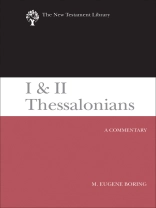I and II Thessalonians are letters written to new Christian communities in Thessalonica early in Paul’s ministry. Paul wrote these letters after a brief stay in order to instruct them further as they anticipate Jesus’ second coming. In this new volume in the acclaimed New Testament Library series, M. Eugene Boring offers a scholarly interpretation of I and II Thessalonians while examining their historical context. Boring helps the reader learn to read these letters in context, particularly in relation to Paul’s life as well as to the new converts who lived in Thessalonica. He addresses aspects such as structure, tone, style, language, and‒for II Thessalonians‒questions of authorship, while offering insightful theological perspectives. Boring’s critical interpretation is a welcome addition to the New Testament Library and provides a solid resource for both the academy and the church.
The New Testament Library offers authoritative commentary on every book and major aspect of the New Testament, providing fresh translations based on the best available ancient manuscripts, critical portrayals of the historical world in which the books were created, careful attention to their literary design, and a theologically perceptive exposition of the biblical text. The editorial board consists of C. Clifton Black, Princeton Theological Seminary; M. Eugene Boring, Brite Divinity School; and John T. Carroll, Union Presbyterian Seminary.
About the author
M. Eugene Boring is Professor Emeritus of New Testament at Brite Divinity School, Texas Christian University, in Fort Worth, Texas. He is a coauthor of The People’s New Testament, and the author of numerous books of New Testament Scholarship, including the best-selling Interpretation commentary on Revelation.







![Cover of Brian Schrag & Julisa Rowe: Community Arts for God's Purposes [Chinese] 貼近神心意的社群藝術 Cover of Brian Schrag & Julisa Rowe: Community Arts for God's Purposes [Chinese] 貼近神心意的社群藝術](https://static.worldofdigitals.com/thumb_webp/740/9781645083740.webp)




